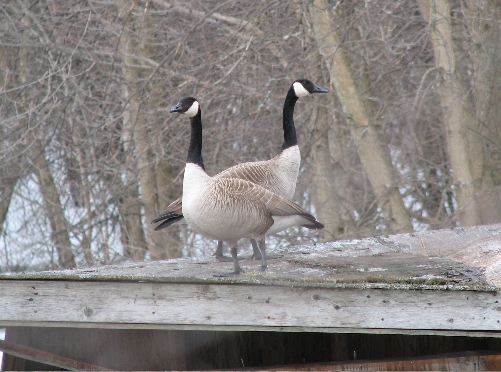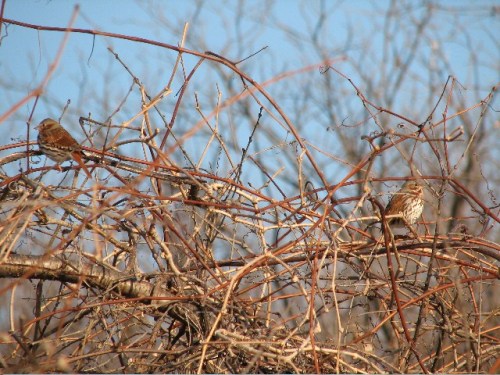|
|
THIS WEEK |
THIS SPRING |
2008 TOTAL |
SITE TOTAL |
|
# birds (and species) banded |
-- |
-- |
-- |
12978 (103) |
|
# birds (and species) repeat |
-- |
-- |
-- |
2226 (59) |
|
# birds (and species) return |
-- |
-- |
-- |
331 (29) |
|
# species observed |
36 |
38 |
39 |
191 |
|
# net hours |
-- |
-- |
-- |
21945.8 |
|
# birds banded / 100 net hours |
-- |
-- |
-- |
59.1 |
|
|
Note: table does not include nocturnal banding (owls) |
Bander-in-charge: Barbara Frei
Censusers: Jean Beaudreault, Shawn Craik, Samuel Denault, Gay Gruner, Demetrios Kobiliris, Genki Kondo, Helen Leroux, Barbara and Don MacDuff, Sarah Marteinson, Chris Murphy, Rodger Titman, Maria Waldron
Notes: As with the beginning of any season, many new species appear on a daily basis. This influx of birds has brought our total number of species observed close to that of last year (38), but we’re still falling 7 species short of last year’s spring total (45), and 12 species short of last year’s total (51). We’re hoping the promise of good weather will start bringing those migrants in!
The turnover in species is also apparent in this week’s top ten, with Canada Goose leaping to the top, followed by Red-winged Blackbird and Snow Goose. Clearly two out of the three won’t be sticking around very long (at least not in large numbers), so continue to expect changes in the top ten over the coming weeks. Spring is not only being signaled by slightly warming temperatures and snow melt, but also by the arrival of certain “springy” species such as Song Sparrow and Ring-billed Gull.
|
This week's
top 10 [last week's rank in brackets] |
|
#
individuals banded |
mean #
individuals observed daily |
|
- |
1. Canada Goose (174.1) [8] |
|
- |
2. Red-winged Blackbird (41.6) [1] |
|
- |
3. Greater Snow Goose (20.3) [-] |
|
- |
4. American Crow (13.0) [3] |
|
- |
5. American Robin (9.6) [7] |
|
- |
6. Song Sparrow (7.0) [-] |
|
- |
7. Black-capped Chickadee (6.1) [5] |
|
- |
8. Ring-billed Gull (5.7) [-] |
|
- |
9. Blue Jay (4.6) [10] |
|
- |
10. European Starling (3.9) [-] |
|
|
 Every year the old blind in the back pond teeters closer to collapse, but the Canada Geese still show an interest in it as a nesting site. Time will tell whether they end up seeking out a more stable location for laying this year's eggs (Photo by Barbara Frei).
Every year the old blind in the back pond teeters closer to collapse, but the Canada Geese still show an interest in it as a nesting site. Time will tell whether they end up seeking out a more stable location for laying this year's eggs (Photo by Barbara Frei).
|


